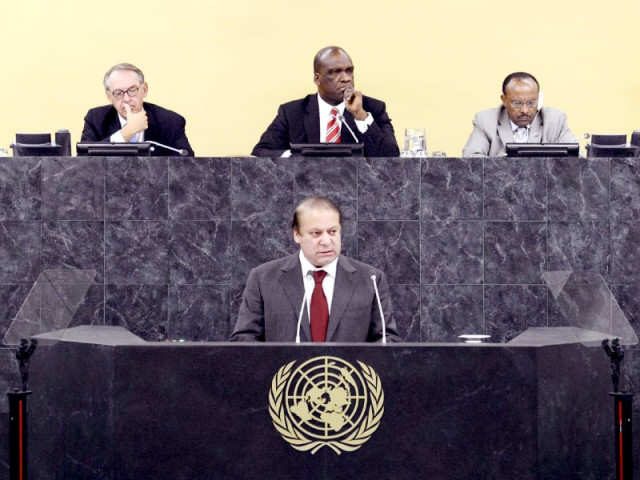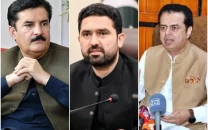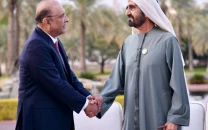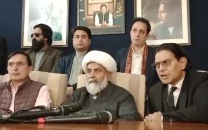Pakistan-India ties: Let’s build on 1999 Lahore accord, says PM
Nawaz calls for end to US drone strikes in Pakistan.

Prime Minister Nawaz Sharif speaks at the 68th United Nations General Assembly. PHOTO: AFP
Prime Minister Nawaz Sharif on Friday said Pakistan and India could pick up from the 1999 Lahore Accord, as he lamented the waste of ‘massive resources’ by the two neighbours in an arms race.
Underscoring Islamabad’s commitment to regional peace and combating terrorism in his address to the United Nations General Assembly, he called for an end to drone strikes on Pakistani soil as well.
Prime Minister Nawaz also expressed his keenness to meet his Indian counterpart Manmohan Singh to ‘make a new beginning towards peace in South Asia’.
“We stand ready to re-engage with India in a substantive and purposeful dialogue,” he said.
“Our two countries have wasted massive resources in an arms race… resources which could have been used for the well-being of our people. We still have that opportunity.”
The premier said Pakistan and India had a solid basis for normalising their relationship.
“We can build on the Lahore Accord signed in 1999, which contained a road map for the resolution of our differences through peaceful negotiations,” he said.
“Pakistan and India can prosper together and the entire region would benefit from our cooperation. This is what our people want and this is what I have long aspired for.”
At the same time, however, Nawaz called for resolving ‘festering disputes’ and urged the UN to play its role in this regard.

“The United Nations must continue to remain attentive to the issue of Jammu and Kashmir and the full realisation of the right to self-determination of its people. The issue was presented before the Security Council (UNSC) in 1948; and yet it remains unresolved after nearly seven decades,” he said.
“The suffering of the people cannot be brushed under the carpet because of power politics.”
He urged the international community to provide Kashmiris the opportunity to decide their future peacefully and in keeping with the UNSC resolutions.
Drone strikes and terrorism
Nawaz said Pakistan had suffered ‘grievously’ for the past 12 years because of terrorism and had given huge sacrifices, both in blood and resources.
“We have lost 40,000 precious lives of men, women and children, which include 8,000 defense and security personnel. There have been colossal damages to social and physical infrastructure as well. Our economy has been denied the opportunity to grow fully.”
As such, he said, the country was firmly opposed to terrorism and was intent on ending the menace using all means at its disposal. However, he added, the war against terrorism must be waged within framework of international law.
“The use of armed drones in the border areas of Pakistan is a continued violation of our territorial integrity. It results in casualties of innocent civilians and is detrimental to our resolve and efforts to eliminate extremism and terrorism from Pakistan,” the premier said.
“I have urged the United States to cease these strikes, so that we could avert further casualties and suffering.”
The PM said he tried to forge national consensus on a cohesive policy to eliminate terrorism. “For that purpose, I convened an all parties conference, which spoke unanimously against terrorism.”
He defended his government’s offer of dialogue to the Taliban to end militancy, saying he was trying to ‘wean young extremists off extremism’ and integrate all segments of society into the national mainstream.
“Dialogue should not be seen as a sign of weakness or a tool of appeasement… Winning hearts and minds, particularly of the youth, are as important as using guns to deter terrorism.”
The premier also sought to distance Islam from terrorism.
“Terrorism knows no borders. It has no religion or creed, which is why maligning a whole people or a religion on this account, is unfair and unwise,” he said, adding that the stereotyping of Muslims as extremists and terrorists must stop.
“Contemporary racism in the name of religion is on the rise. Peaceful Muslim communities are profiled ... Their faith, culture, holy personalities and scriptures are under attack,” he said.
“We must all use the influence and reach of the UN to avert a clash of civilisation.”
Stable Afghanistan
Nawaz also reaffirmed Pakistan’s commitment to a stable Afghanistan.
“We do not wish to interfere in Afghanistan’s internal affairs, nor do we have any favorites in that country… We have an earnest hope that the Afghans themselves will unite for peace, prosperity and development of their great country.”
Nuclear technology
Premier Nawaz told the 193-member forum that Pakistan is a responsible nuclear power and qualifies for access to civilian nuclear technology.
“Safe, secure and peaceful use of nuclear energy, without discrimination, is essential for economic development,” he said.
The premier said a mainstream partner in the global non-proliferation regime, Pakistan has the credentials to join the multilateral export control regime, including the Nuclear Suppliers Group.
“As a responsible nuclear weapon state, we will continue to pursue the goals of disarmament and non-proliferation and adhere to the policy of credible minimum deterrence, without entering into an arms race.”
Published in The Express Tribune, September 28th, 2013.



















COMMENTS
Comments are moderated and generally will be posted if they are on-topic and not abusive.
For more information, please see our Comments FAQ